Workers and students blamed President Macron for the economic and social deterioration of France as thousands took to the streets to call for his resignation.
Anti-austerity protests swept through France on Thursday with demonstrators voicing complaints that eight years of leadership by France’s business-friendly president have benefited too few people and hurt too many.
Marching in Paris, hospital nurse Aya Touré said she was ‘really, really fed up’ with France’s leaders.
‘Those people are governing us, they have no clue about real-life issues. We are paying the price.’
‘I don’t know how it’s even possible to consider making cost savings,’ said Clara Simon, a history student who marched in the crowd of demonstrators in Paris, brandishing a poster that read: ‘University in danger.’
‘There’s already no money for soaps in the toilets, no money to fix a seat when it’s broken,’ she said.
‘I’m angry because the economic and social situation in France is deteriorating every year.’
Macron’s opponents complain that taxpayer-funded public services – free schools and public hospitals, subsidised health care, unemployment benefits and other safety nets that are cherished in France – are being eroded by his governments.
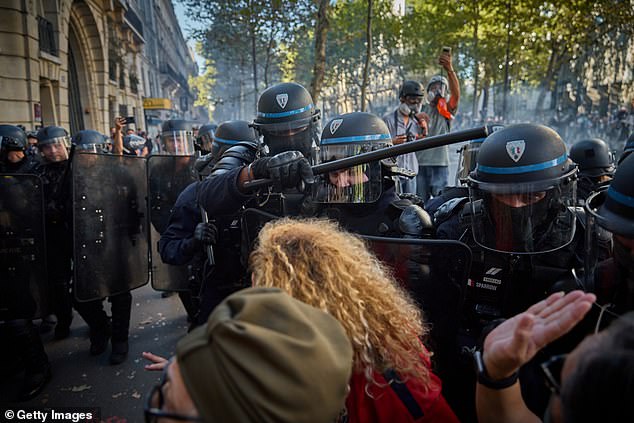
Workers and students blamed President Macron for the economic and social deterioration of France as thousands took to the streets to call for his resignation
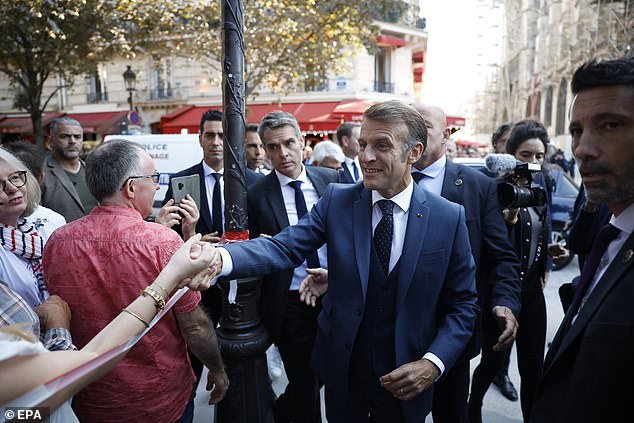
French President Emmanuel Macron (C) shakes hands after his visit at Notre Dame ahead of Local Heritage Days to celebrate the reopening of the cathedrals Towers to visitors in Paris, France, 19 September 2025
Left-wing parties and their supporters want the wealthy and businesses to pay more to help rein in France’s debts, rather than see public spending cuts that they contend will hit low-paid and middle-class workers.
‘We need to find money where there’s money,’ said Pierre Courois, a 65-year-old retired civil servant.
‘France’s deficit is an issue, but it’s not by cutting on public services that you fix it.’
Many complained about mounting poverty, sharpening inequality and struggles to make ends meet.
‘Our pay is stuck, colleagues are leaving, and wards are closing beds,’ said 34-year-old public hospital nurse Stephane Lambert.
‘For us it’s the same story: less money in our pockets, fewer hands to help, more pressure every day.’
At a before-dawn protest at a Paris bus depot, striking transportation worker Nadia Belhoum said people are ‘being squeezed like a lemon even if there’s no more juice.’
Macron’s new prime minister Sébastien Lecornu is scrambling to put together a budget for next year, as well as a new government.
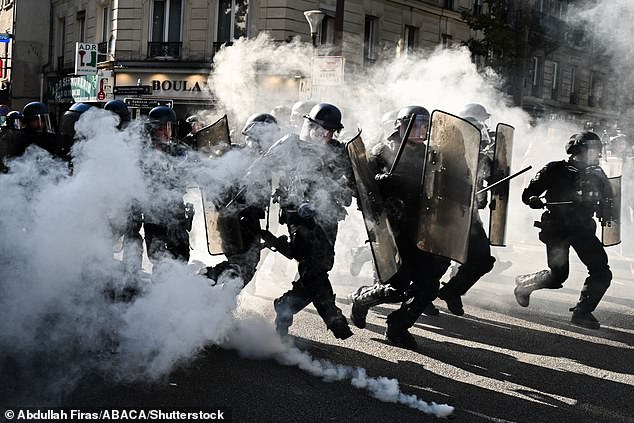
French riot police use tear gas on protesters during clashes at a demonstration in Paris as part of a day of nationwide strikes and protests against the government and cuts in the next budget, with supporters of the ‘Bloquons Tout’ (Let’s Block Everything) movement, France, September 18, 2025
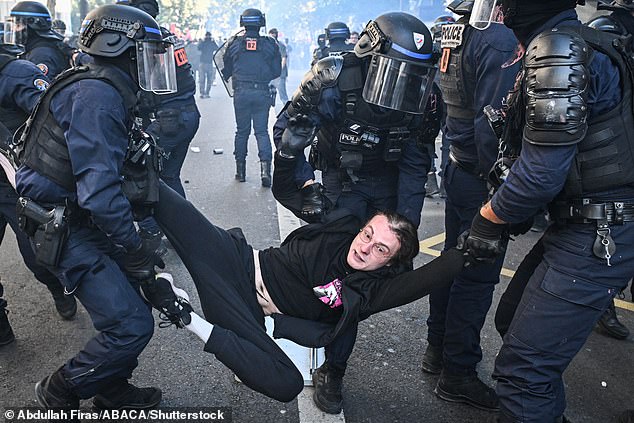
Clashes occur between French riot police and protesters during a demonstration as part of a nationwide strike in Paris on September 18, 2025
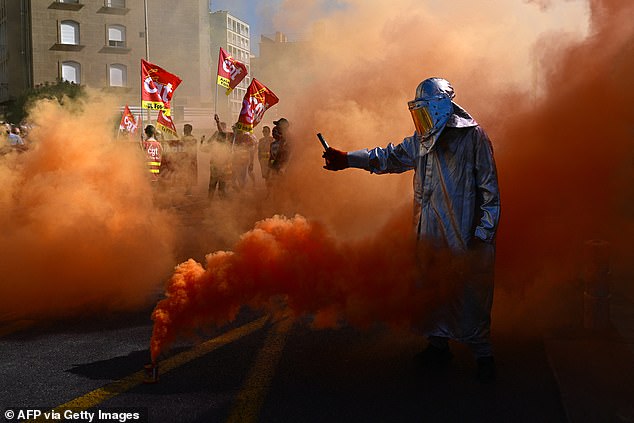
A protester lights flares in Marseille, southeastern France, on September 18, 2025, during a day of nationwide strikes and protests called by unions over France’s national budget
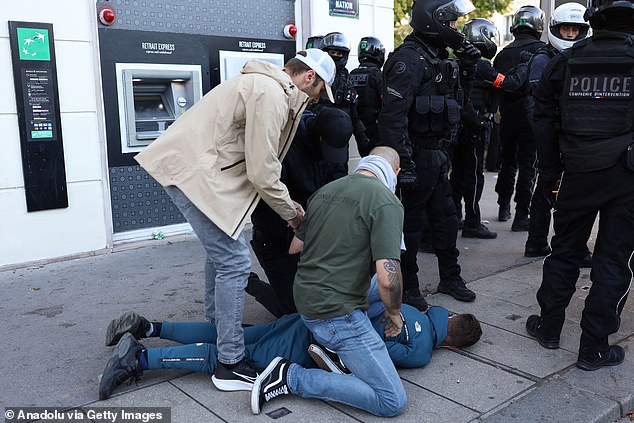
olice officers intervene the protesters during ongoing strikes and protests across the country in Paris, France on September 18, 2025
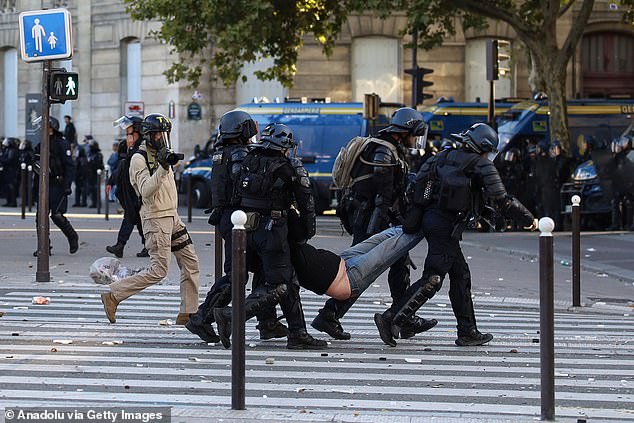
Workers and students have blamed President Macron for the economic and social deterioration of France as thousands took to the streets to call for his resignation
On a post on X, he vowed to meet the unions again ‘in the coming days, adding, ‘The demands made by the union representatives and echoed by demonstrators in the marches are at the heart of the consultations I have initiated.’
Lecornu and Macron are under pressure on one side from protesters and left-wing parties opposed to budget cuts and, on the other, from investors concerned about the deficit in the euro zone’s second-largest economy.
‘Bringing in Lecornu doesn’t change anything – he’s just another man in a suit who will follow Macron’s line,’ said 22-year-old student Juliette Martin.
On his first day in office last week, anti-government protests saw streets choked with smoke, barricades in flames and volleys of tear gas as demonstrators denounced budget cuts and political turmoil.
‘For decades we’ve been the ones paying for the rich, paying for the billionaires, paying for the capitalists and they’ve emptied our pockets,’ automobile factory union representative Jean Pierre Mercier said.
‘And today, supposedly, we must repay the debt, and once again it’s only the workers who are asked to pay, whether we’re employed, disabled, or retired.’
The first whiffs of police tear gas came before daybreak, with scuffles between riot officers and protesters in Paris.
The collapse of successive governments – brought down by votes in parliament – that sought to push through savings has given Macron’s critics a sense of momentum.
The ‘Block Everything’ campaign that developed online before taking to the streets also added to the climate of crisis.
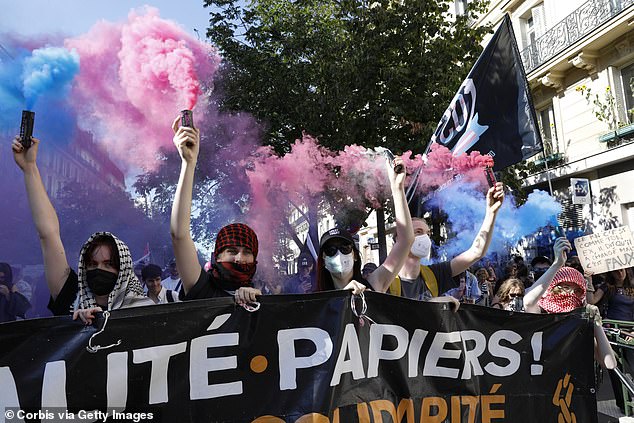
Macron’s opponents complain that taxpayer-funded public services are being eroded by his governments
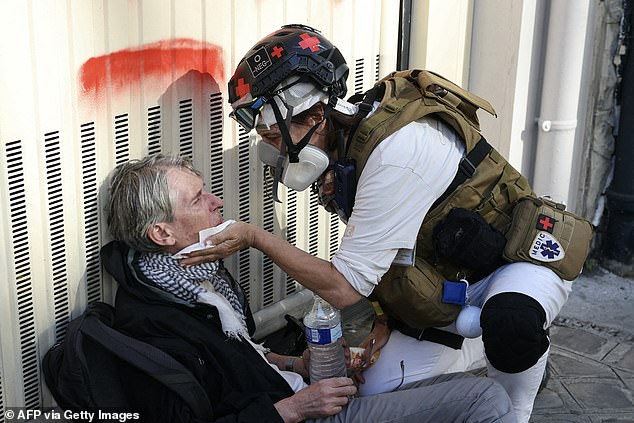
A street medic takes care of a man in Paris on September 18, 2025, during a day of nationwide strikes and protests called by unions over France’s national budget
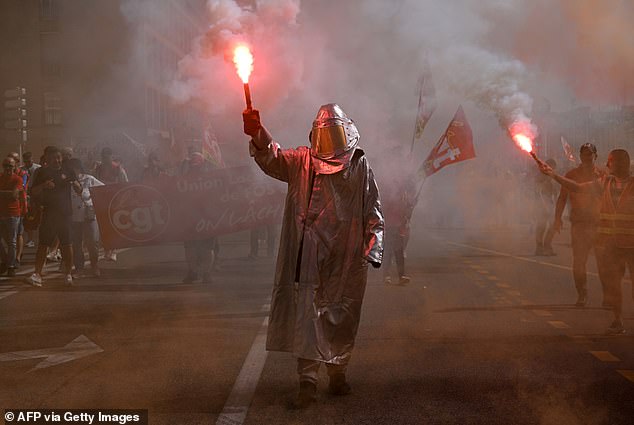
A protester lights flares in Marseille, southeastern France, on September 18, 2025
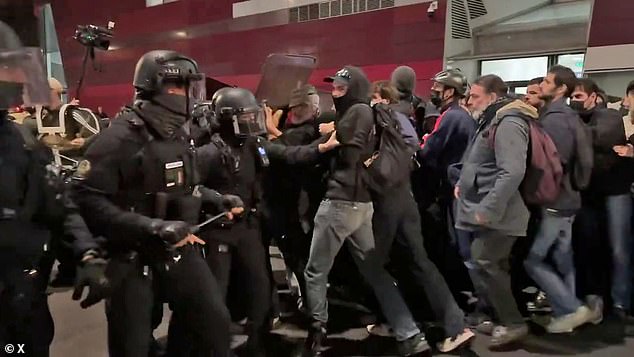
A ‘Black Thursday’ of strikes and street protests was announced, following last week’s ‘Block Everything’ campaign
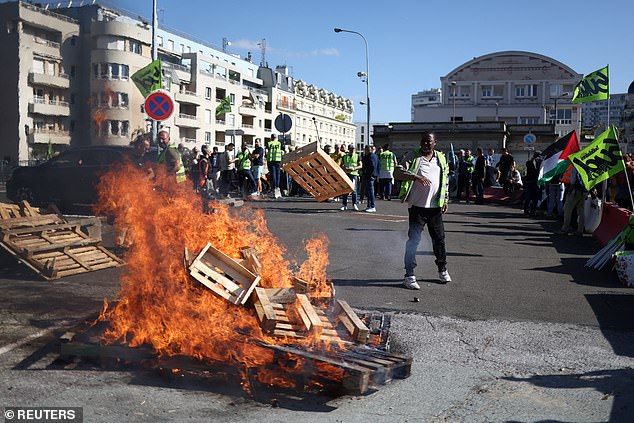
French SNCF railway workers on strike, holding Sud Rail labour union flags, gather near burning wooden pallets at Gare de Lyon train station in Paris as part of a day of nationwide strikes and protests against the government and cuts in the next budget
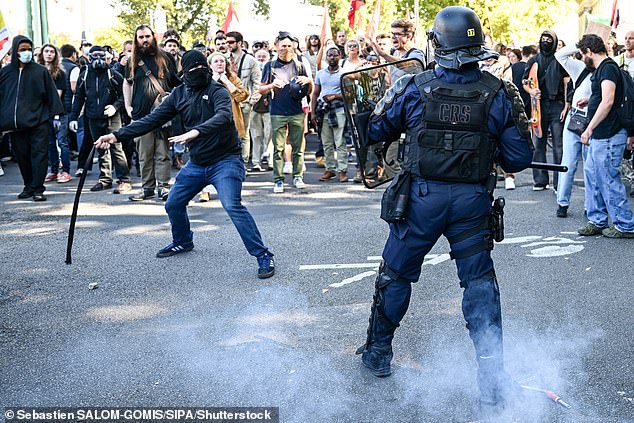
Demonstrators clashes with anti-riot police officers (CRS) during a demonstration called by unions trade against austerity, in Nantes, western France, on September 18, 2025
As it did last week, the government said it was again deploying police in exceptionally large numbers – about 80,000 in all – to keep order on Thursday.
Police were ordered to break up blockades and other efforts to prevent people who weren’t protesting from going about their business.
Paris police used tear gas to disperse a before-dawn blockade of a bus depot and deployed in force, backed by armored vehicles and firing more gas, at the afternoon march in the capital.
French broadcasters also reported sporadic clashes in the western cities of Nantes and Rennes, and Lyon in the southeast, with volleys of police tear gas and projectiles targeting officers.
Striking rail workers waving flares made a brief foray into the Paris headquarters of the Economics Ministry, leaving trails of smoke in the air before leaving.
‘The bourgeoisie of this country have been gorging themselves, they don’t even know what to do with their money anymore. So if there is indeed a crisis, the question is who should pay for it,’ said Fabien Villedieu, a leader of the SUD-Rail train workers union.
‘We are asking that the government’s austerity plan that consists of making the poorest in this country always pay – whether they are employees, retirees, students – ends and that we make the richest in this country pay.’
The Interior Ministry reported 181 arrests nationwide as the afternoon ended and more than 450,000 demonstrators outside Paris, with protests in big cities and small towns. Paris police said that another 55,000 people marched in the capital.
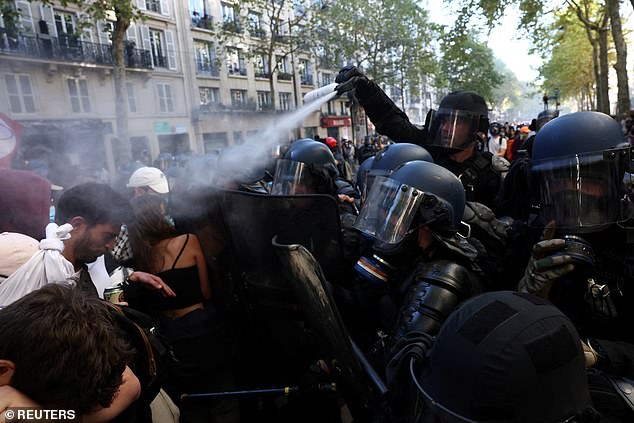
French riot police use tear gas on protesters during clashes at a demonstration in Paris as part of a day of nationwide strikes
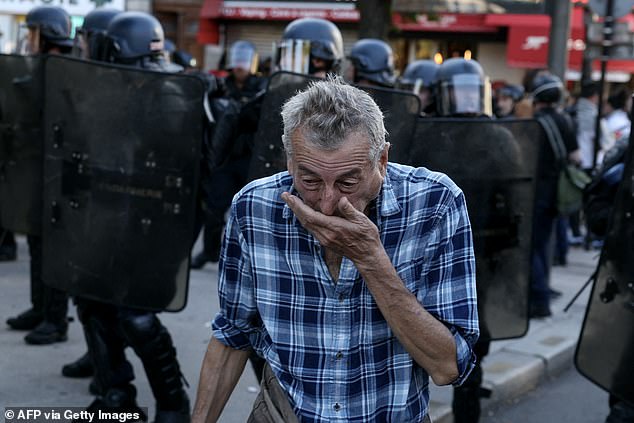
A man cover his mouth with his hand in Paris on September 18, 2025, during a day of nationwide strikes and protests called by unions over France’s national budget
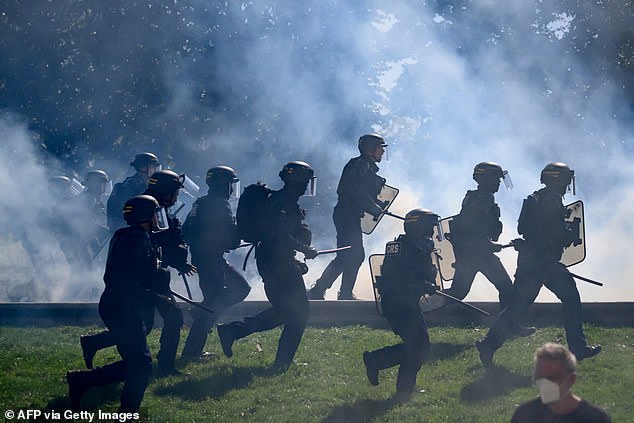
Anti-riot police officers charge during a demonstration in Nantes, western France, on September 18, 2025
Participation estimates from the CGT, among unions that called the strikes and demonstrations, were double those of police, reporting more than 1 million strikers and protesters nationwide.
The Paris Metro operator said that rush-hour services suffered fewer disruptions than anticipated, but that traffic largely stopped outside those hours except on three driverless automated lines.
French national rail company SNCF said that ‘a few disruptions’ were expected on high-speed trains to France and Europe, but most will run.
‘Every time there’s a protest, it feels like daily life is held hostage,’ said office worker Nathalie Laurent, grappling with morning disruptions on the Paris Metro.
‘Lecornu – he’s only just started, but if this is his idea of stability, then he has a long way to go,’ she said.












